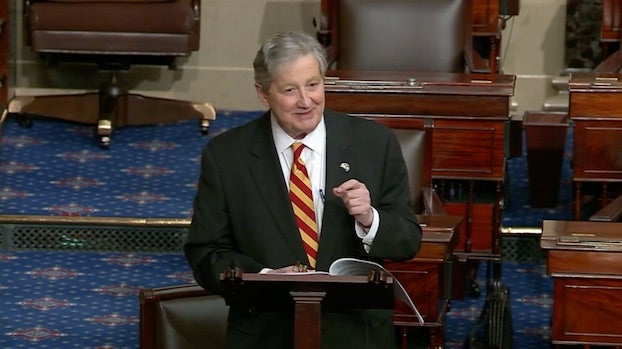House looking at proposed increase in cigarette tax
Published 9:50 am Monday, April 27, 2015
A $1.18 increase in the state’s cigarette tax leads off efforts of the state House today to find revenues to help fill a $1.6 billion hole in Gov. Bobby Jindal’s proposed $24.6 billion budget for fiscal year 2015-16. The House Ways and Means Committee has eight bills scheduled for hearings today and five more for Tuesday.
The Senate Finance Committee got the revenue ball rolling last week when it approved a proposed constitutional amendment ending the inventory tax levied by local governments. The measure moved to the full Senate for debate.
Ending the tax would save the state up to $600 million annually, but local governments would lose an equal amount. Sen. Robert Adley, R-Benton, told local officials the state would find revenues or solutions for replacing money they would lose in the process.
Both the House and Senate will begin final action Monday on a number of bills that have cleared committees. The House Ways and Means Committee will begin deciding the fate of those 13 revenue-related bills.
Rep. Harold Ritchie, D-Bogalusa, is sponsor of House Bill 119, one of 10 measures proposing cigarette tax increases. The current tax is 36 cents per pack, and Ritchie’s bill would boost the total tax to $1.54 per pack, the national average.
Missouri (17 cents) and Virginia (30 cents) are the only two states with cigarette taxes lower than Louisiana.
Ritchie’s legislation would raise $250 million annually.
The Associated Press reports the Louisiana Oil Marketers and Convenience Store Association opposes the bill. Its executive director said it would put state stores at a competitive disadvantage with the neighboring states of Mississippi (68 cents), Arkansas ($1.15) and Texas ($l.41).
Rep. Bryan Adams, R-Gretna, has filed H.B. 366, which contains a proposal advanced by Jindal that changes certain refundable tax credits to nonrefundable tax credits. It would raise $81 million in the next fiscal year and $554 million and higher in succeeding years.
Most of those revenues would come from ending extra payments being made to companies that can’t reclaim all of the inventory taxes they pay to local governments on their state income tax returns. Companies and some legislators oppose the Jindal solution, calling it a tax increase on business and industry.
Rep. Chris Broadwater, R-Hammond, is proposing changes to deductions allowed for corporate income taxes. H.B. 218 would increase revenues by $1.2 million in the next fiscal year and up to nearly $20 million in the fifth year.
H.B. 402 by Rep. Julie Stokes, R-Kenner, changes eligibility for income tax credit given for taxes paid in other states. It would raise $20.8 million in the first year and $34 million by the fifth year.
Stokes has also filed H.B. 531 that requires that certain deductible items be added back on certain corporate income tax returns. It has no fiscal note attached.
H.B. 775 by Stokes changes the method for determining income subject to the corporation income tax. A fiscal note says it is likely that some net increase in tax collections could occur.
Rep. Taylor Barras, R-New Iberia, has filed H.B. 466. It changes eligibility requirements for Enterprize Zone contracts to receive sales tax rebates and income tax credits. It would raise $1 million by fiscal year 2016-17 and $4 million by 2019-20.
Rep. Eric Ponti, R-Baton Rouge, is proposing changes in the solar energy systems tax credit. A fiscal note says there is no anticipated direct material effect on government expenditures as a result of the legislation.
Five measures up for Tuesday hearings deal with the state’s capital outlay construction program, motion picture tax credits, collection of sales and use taxes by remote dealers and suspension of a certain portion of state sales and use tax exemptions.
Rep. Walt Leger, D-New Orleans, is sponsor of H.B. 555 that seeks to suspend some state sales and use tax exemptions. It would raise $126.8 million in the first year and $137.2 million by the fifth year.
Other House and Senate committees will be meeting through Thursday, the last day scheduled for the fiscal session’s third week. The session has to end by June 11.
Louisiana Legislature





